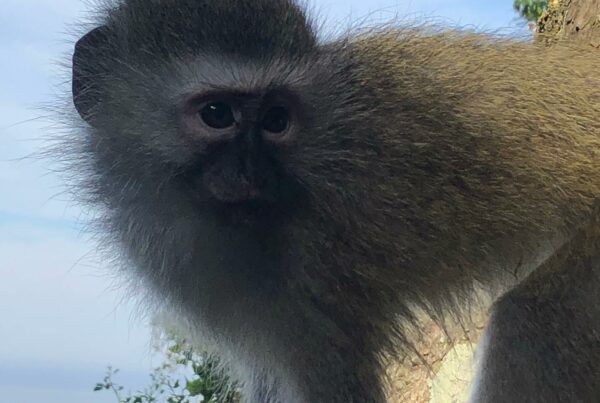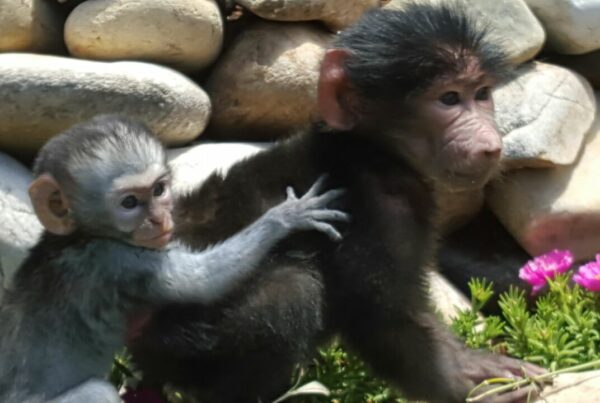Educational talks are done by appointment with school groups, businesses, farming communities and individual homes. All school presentations are done in informative, engaging and interactive ways for school kids. All other talks are done in accordance with the situation and completely free of charge. Our educational goal is to be able to travel throughout South Africa to better reach more people.
With over 30 years combined experience, Jo & Charne work patiently to get a plan in place for various situations.
Schools and Classrooms
What teachers can to do when monkeys cross the line
Outside the classroom
- Make sure there are no variables (food, packaging, rubbish) that are attracting them.
- If monkeys have crossed the line, use your tools to scare them away. Do not look at them directly in the eyes and no smiling or showing of teeth. Be calm, yet assertive in your actions. Remember: You are much bigger and stronger than them. Stand your ground, do not back away until they are where you okay them to be. Repeat as many times as necessary. They will eventually “get it” and stop crossing the line / leave the property all together.
- Please remind your students NOT to react! Students must remain quiet and display passive body language.
Inside the Classroom
If you enter a classroom that is occupied by one or more monkeys…
- Remain calm!
- Give them access to an exit. Slowly and calmly, back away.
- Do NOT make direct eye contact or showing of teeth.
- If they do not leave on their own and you do not feel comfortable doing this, find someone who is, but do not block their exit. Use tools to gently coax them out.
If you are inside a classroom and monkeys are jumping up on windows or entering doorways…
- Remain calm!
- Remind students to be quiet and NOT react!
- Take away or hide food items or food associated items.
- Be assertive, use your tools and scare/chase them away to the imaginary line.
- Close windows and doors.
Try to make sure all windows and doors are closed when not in use.
Be consistent in teaching the monkeys that they are not supposed to be there. They will eventually learn to respect your territory and will eventually move on.
“In the end we will conserve only what we love; we will love only what we understand; and we will understand only what we have been taught.” -Baba Dioum
Communities & Residential
How to stop unwanted behavior
There are two main components to use when trying to stop unwanted behavior.
- Take away the access to artificial food. The only way to extinguish an unwanted behavior is to never allow that behavior to occur again. You can do this by making sure you do not feed your dogs outside, stop feeding other wildlife or domestic animals during the day, close doors and windows and stop leaving rubbish outside and exposed. Please keep in mind that you may have to only do this for a short while. Monkeys must eat to survive and if you take away the access to your food, then they will realize they must move on. Soon, they will not even bother to come back, because they only have so much time during the day to forage.
- Enforce positive punishment. Monkeys are very intelligent. They are our cousins and we certainly share many characteristics. They understand boundaries and territory. If another troop of monkeys came onto the territory of a troop and they were not welcomed, then aggression and fighting would ensue. They would let each other know who’s welcome and who’s not. If you have an area in you garden or in and around your home that you do not want the monkeys to enter, then you can instill negative punishment to show them they must not go any further. I would like to think that most people would be happy enough to enjoy their troop from a certain distance. For example, maybe you do not want them going into your windows, but you do not mind them foraging along a row of trees. You can teach them that one area is okay, but another is not. OPTIONS FOR DOING THIS:
-
- Be assertive in your actions (they can read body language very well and sense your intent)
- Chase them back to the area that is acceptable (towards their foraging route, away from your house and not towards danger)
- If you need a tool to help you feel strong and unafraid, use something that will help you feel assertive (a broomstick or long cricket bat)
- WARNING: be sure you stop chasing once they have reached the desired area (if you continue to chase them incessantly, you will eventually extinguish your authority and the behaviour you are trying to teach). Actions differ if the primate is INSIDE your house:
-
- REMAIN CALM
- Make sure they have a way out safely
- Allow them to find their way out or gently lead them in the right direction.
- Once outside, you can carry on being assertive if they haven’t already taken off towards the trees or safety
Preventative measures have been proven effective, however primates are intelligent and sometimes quickly catch on or assimilate. While these are hit or miss, they may be worth trying in your situation:
-
- placement of rubber snakes
- bird of prey statues
- scarecrows
- tin cans filled with noise makers placed around the house
- electric fencing
Positive punishment using active measures is also sometimes effective:
-
- strong water hoses or power hoses
- showing gun-like objects
- loud noise makers
If you have any further questions or need assistance, please don’t hesitate to call: Charne – 072 960 5507 Jo – 084 744 4909
-



